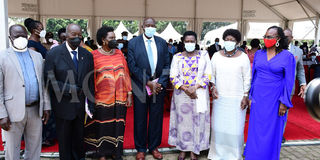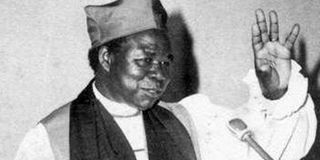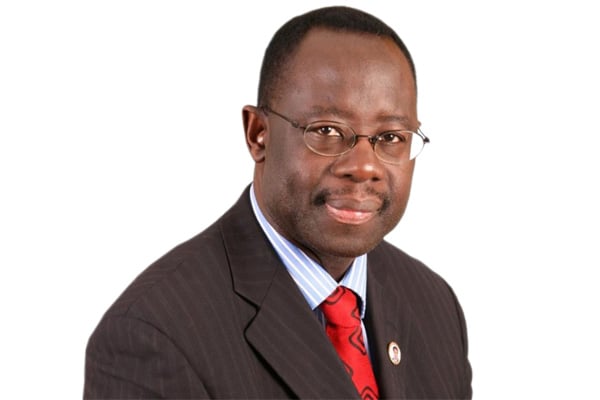Prime
Church to State: In Luwum’s name stop ongoing torture

Vice President Jessica Alupo (3rd right), First Deputy Prime Minister Rebecca Kadaga (2nd right) and other government officials with some of the members of Janani Luwum family during celebrations to mark Janani Luwum Day at Kololo in Kampala on February 16, 2022. PHOTO/ABUBAKER LUBOWA
What you need to know:
- Archbishop Stephen Kaziimba says eliminating cruelty allegedly perpetrated by State operatives, and enforcing accountability, would make the annual tribute to the slain prelate “meaningful”.
The Church of Uganda has asked the government to conclusively investigate and end reported cases of torture of civilians, many of them political opponents and critics.
Speaking yesterday at the 45th commemoration of the martyrdom of archbishop Janani Luwum, archbishop Stephen Kaziimba Mugalu said eliminating cruelty allegedly perpetrated by State operatives, and enforcing accountability, would make the annual tribute to the slain prelate “meaningful”.
Janani Luwum was the second African archbishop of Uganda, Rwanda, Burundi, and Boga-Zaire, and a fierce critic of the excesses of the Idi Amin regime that killed him in the year of the centennial anniversary of the founding of the Anglican province here.
“He (Luwum) is remembered as a voice for the voiceless, and also an advocate for human rights. As we remember him today, we need to think about protecting life and human rights,” Archbishop Kaziimba said.
“I am very disappointed by some people when I read the newspapers; that there are still some people who are torturing others. This is against what the President (Museveni) told Ugandans,” he added.

"They are going to kill me. I am not afraid…I can see the hand of God in this,” Archbishop Janani Luwum, February 16, 1977.
Allegations of torture and abuses of rights of civilians, which President Museveni has in the past said formed part of his reasons to lead a successful armed rebellion, has lately dominated public discourse following vocal protestations by new victims.
Satirical author Kakwenza Rukirabashaija and Samuel Masereka, the coordinator of the Opposition National Unity Platform (NUP) party in Kasese District, have recounted chilling tales of being tortured at, among others, the Chieftaincy of Military Intelligence (CMI) headquarters in Mbuya, a Kampala suburb.
In separate accounts to the media, they said injuries inflicted on them during incarceration included being electrocuted, tearing off of their flesh and nails with pliers, squeezing their genitals and repeated striking of their ankles to weaken the legs.
These reported violations, which mirror what rights groups chronicled under Amin’s government, are what Archbishop Kaziimba boldly spoke out against yesterday, saying the masterminds are defying presidential directives.
President Museveni has explicitly demanded that security forces stop torture of suspects to extract information, but the violations continue, exposing his government to tighter scrutiny and condemnation both at home and abroad.
In August 2021, he rebuked security operatives accused of brutalising civilians and criminal suspects, warning that extracting information by force and through inflicting pain is defective interrogation, and untenable.
That was five months ago, and a repetition of a warning in his May 15, 2017 letter to security and intelligence chiefs headlined “concerning torture”.
In apparent reference to failure by security and spy agencies to heed the President’s orders, Archbishop Kaziimba said: “…why [doesn’t] the government make thorough investigation [to establish] who are those torturing Ugandans, [and] if it’s true, so that our celebrations today (yesterday) of Janani Luwum [Day] become meaningful?”
“People who are torturing others are disobeying the President of Uganda. I want to pray that as we celebrate this day, human rights, peace and the rest should be given first priority…,” he said.
“May God help us that the torturers are not accepted and if there are those who have done wrong, they should be brought to courts of law so that the needful is done,” he added.
Luwum became an archbishop in 1974, three years after Amin seized power. Following his killing, the Anglican Church made him a 20th Century martyr, and an imposing statue stands at the entrance of the grand Westminster Abbey in central London, UK, in his honour.
Amin allegedly ordered the killing of Luwum, whom he had earlier befriended to gain credibility, on February 16, 1977, days after the prelate delivered to him an ecumenical protest letter over widespread murders, enforced disappearances of citizens, abductions, and State-inspired violence.
Summoned for grilling over allegations of allying with deposed Milton Obote and stockpiling weapons, Luwum, who hailed from Mucwini in Kitgum District, was later found dead alongside government ministers Charles Oboth-Ofumbi and Erinayo Oryema in an apparently stage-managed car accident in Kampala.
To honour the prelate’s legacy and promote religious tourism, the Museveni government gazetted February 16 as Luwum Day and a national public holiday.
In a speech read yesterday for him by Vice President Jessica Alupo, Mr Museveni urged Ugandans to guard the values and principles for which Luwum sacrificed his life.

Church of Uganda Archbishop Stephen Kaziimba Mugalu (3rd right) and Vice President Jessica Alupo (2nd right) with some of Luwum’s family members.
“The archbishop displayed great courage in the face of danger. He had the option of running into exile, but he chose to stay with his flock and endure humiliation and intimidation from Amin. He refused to abandon the people for the sake of his own safety,” Ms Alupo said, reading from a prepared text.
She added: “In the end, he may have paid a great personal sacrifice with his life, but his death strengthened the people’s resolve and determination to get rid of the Amin regime.”
A combined force of Tanzanian army and Ugandan exiles ousted Amin two years later, in April 1979, forcing him to flee to Saudi Arabia, where he died on August 16, 2003.
Yesterday, President Museveni noted in his written speech that the torture and murder of Luwum was both criminal and a sin, adding that Amin had invited a curse on himself by killing the prelate.
“Religious leaders carry the anointment of the Almighty God to shepherd and guide the people in spiritual matters. Therefore, when you harm an anointed person, you are directly obstructing the progress of God’s work and bringing a terrible curse upon yourself. Idi Amin brought a curse upon himself by murdering Archbishop Janani Luwum,” he said in reference to Psalms 105:15.
According to the President, Amin’s “bankrupt” leadership had affected not only Uganda, but the region as a whole, something that incentivised the Front for National Salvation (Fronasa) resistance that he [Mr Museveni] led.
“The fruits of liberation are now ripe in every sector of our society. Uganda enjoys unprecedented peace and stability. There are some few evil doers, like the ADF [Allied Democratic Forces], who are puzzled by this great achievement. Their attempts to distract us from the work of building Uganda into a modern middle-income country have been decisively defeated,” he said.
The ADF is a Ugandan rebel group, designated by the United States as a terrorist group, which the Uganda People’s Defence Forces is currently pursuing in eastern Congo years after it dislodged the outlaws from western Uganda lairs.
At yesterday’s ceremony in Kololo, Bishop Samuel George Egesa of Bukedi Diocese, in a sermon on “Hope Beyond Affliction”, said Amin cut short the life of Luwum thinking it would curtail his legacy.
“For them, they thought when Luwum is murdered, that would be the end. But we are seeing the evidence that there is hope beyond death,” he said.
READ




